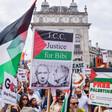Rights and Accountability 8 September 2020

Authorities in Gaza close off a road in Deir al-Balah, central Gaza, in an attempt to halt the spread of COVID-19, 3 September.
APA imagesInternational development agencies working in occupied Palestinian territory are calling on Israel “to end all collective punitive measures against the civilian population of the Gaza Strip.”
The Association of International Development Agencies warned that “Gaza’s existing deep and protracted humanitarian crisis now threatens to intensify rapidly” as the number of confirmed coronavirus cases in the territory continues to rise.
The capacity of Gaza’s health care system has eroded severely due to Israel’s blockade, imposed for more than 13 years.
Gaza’s hospitals have contended with multiple Israeli military offensives and Israel’s widespread use of live fire against protesters, causing thousands of catastrophic injuries.
Now medics are faced with a new crisis as the first cases of coronavirus outside of Gaza’s quarantine centers were detected late last month. As of Tuesday, there were nearly 1,200 active cases of COVID-19 in the territory – all but 30 of them community transmitted infections.
The sharp increase in infections has raised the specter of a “nightmare scenario” of an outbreak “beyond the coping capacity of Gaza’s healthcare system, long on the brink of collapse,” the charity Medical Aid for Palestinians stated on Monday.
Ignacio Casares Garcia, the head of the International Committee of the Red Cross in Gaza, has warned that Gaza’s healthcare system “would not be able to deal with more than a few dozen coronavirus patients.”
No coronavirus plan
Despite its international legal obligations as the occupying power, Israel has not published any coronavirus response plan for Gaza, ignoring the appeals of human rights groups that called on its military bodies to do so.
Human rights advocates have also called on Israel to lift restrictions on travel outside of Gaza for medical treatment. In May, the Palestinian Authority ended its coordination between patients in Gaza and Israeli occupation authorities in protest of Israel’s plans to annex West Bank territory.
Physicians for Human Rights-Israel handled more than 250 such requests for treatment by patients in Gaza between May and August.
The group said Israel had tightened its criteria for permitting Gaza patients to access treatment in the country or travel through it to reach medical care in the West Bank.
Israel approved only half of the requests submitted, the rights group told media.
The UN announced this week that the World Health Organization will serve as a liaison in the PA’s stead:
Ran Goldstein, director of Physicians for Human Rights-Israel, said that this mechanism would not meet the needs of patients in Gaza.“Every day, hundreds of patients do not leave for medical treatment because they didn’t get a permit, or even a reply to the requests they submitted, and have consequently missed vital treatments,” he told the Tel Aviv daily Haaretz.
“Every patient should be allowed to leave Gaza for treatment with no delays and no bureaucratic hurdles,” Goldstein added.
Yet Palestinians’ basic rights, such as the right to access medical treatment, continue to be treated as subject to negotiation rather than protection, by UN officials like Nickolay Mladenov, the secretary-general’s Middle East peace envoy.
This approach has only contributed to the longevity of the blockade, for which Israel has paid little consequence. When Palestinians do resist, they are condemned by the same officials who meanwhile fail to call for an immediate end to the suffocating siege.
UN figures concerned with protecting and promoting human rights, rather than advancing the moribund two-state solution, strike a different tone.Experiment in human despair
“There is no comparable situation in the world where a substantial population has endured such a permanent lockdown,” Michael Lynk, the UN special rapporteur in occupied Palestinian territory, stated last week.
“Our international standards of dignity and morality do not allow such experiments in human despair,” Lynk added.
He said that behind “the launching of rockets and incendiary balloons … is the long-term impoverishment of Gaza by Israel’s 13-year-old comprehensive blockade.”
Lynk’s remarks came after the announcement on 31 August of a truce between Hamas and Israel that prevented a full-scale military confrontation in Gaza. But the truce brought only a return to a dismal status quo in the territory – something the Palestinian Boycott, Divestment and Sanctions National Committee has said isn’t enough for Gaza’s long-suffering population.
As part of that truce, Israel agreed to resume the transfer of Qatari-funded fuel to Gaza, which it had cut off in mid-August following the launch of incendiary balloons and rockets from the territory.The halted fuel transfers forced Gaza’s sole power plant to shut down, reducing electricity availability to only a few hours per day as residents were ordered to stay at home to slow the spread of COVID-19.
Lynk said that the cutting of fuel supplies “makes a humanitarian crisis even worse.”The UN special rapporteur called on Israel to lift the blockade and for the “full realization of human rights in Gaza.”





